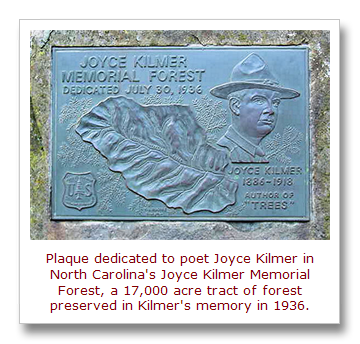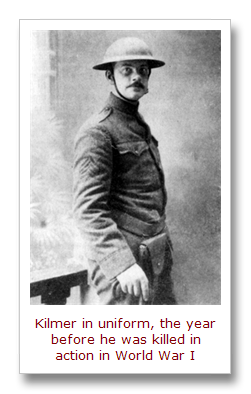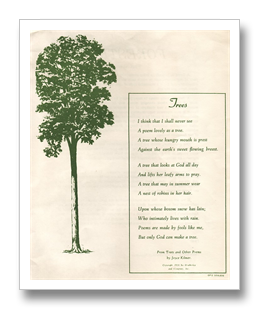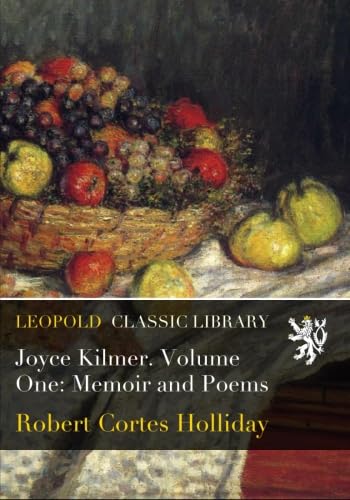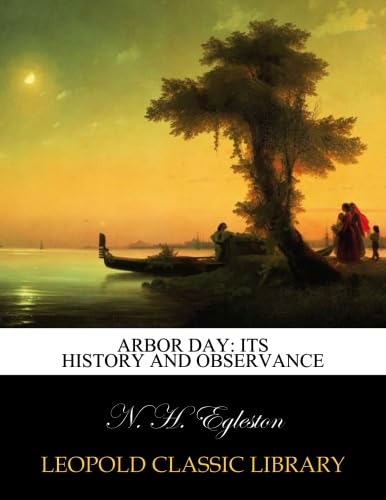On a chilly winter afternoon in 1913, at his home in New Jersey, poet Joyce Kilmer jotted down the first two lines of a new poem in his notebook, along with the date — February 2, 1913.
Those two lines went on to become among the most famous, most inspiring and most mocked bits of American verse in history:
“I think that I shall never see
A poem lovely as a tree.”
The rest of Kilmer’s well-known poem “Trees” was written on a following page of the notebook.
It was first published in the August 1913 issue Poetry Magazine. In 1914, it was included and featured in his second book of poetry, Trees and Other Poems.
Kilmer was already a successful poet, journalist and lecturer in 1914. But it was “Trees” that gave him broad and lasting fame.
Unfortunately, he didn’t live to see just how famous and impactful the poem would become.
When America entered World War I in 1917, Kilmer enlisted. On July 20, 1918, he was killed at age 31 by a German sniper during the Second Battle of the Marne on the Western Front.
In the decades since Kilmer’s death, “Trees” has been reprinted in countless collections of poetry. It became one of the standard poems taught to and recited by American school children.
In 1922, composer Oscar Rasbach turned it into a song that has been recorded by many popular singers and musicians, including Nelson Eddy, Robert Merrill, Paul Robeson, Mario Lanza and Julian Lloyd Webber.
More importantly, the poem helped inspire tree planting programs and forest preservation efforts in the U.S.
It has long been one of the primary pieces of literature that the Arbor Day Foundation uses to promote National Arbor Day, which is celebrated each year on the last Friday in April. (Many states observe Arbor Day on different dates depending on best tree planting times in their area.)
Each year on Arbor Day, the Foundation honors people who make notable efforts to plant and protect trees by giving them a “Joyce Kilmer Award.”
Kilmer was a devout Catholic and his spiritual nature is reflected in the last two lines of “Trees,” which are nearly as famous as the first two lines:
“Poems are made by fools like me,
But only God can make a tree.”
Scholars have noted that Kilmer may have unconsciously or knowingly plagiarized those final lines.
In 1908 and 1909, before becoming an established poet, Kilmer was a school teacher.
It’s likely that he had read or heard about a popular book about children published in 1907, Labour and Childhood, written by the pioneering British children’s health advocate Margaret McMillan.
McMillan encouraged outdoor activities for children. In her 1907 book, using the current British term for indoor school equipment, apparatus, she wrote: “Apparatus can be made by fools, but only God can make a tree.”
Of course, many critics have also lambasted “Trees” and Kilmer’s other poems for being simplistic, stylistically outdated, syrupy, sentimental and (punningly) sappy.
Since 1986, The Philolexian Society of Columbia University, a college literary society of which Kilmer was once vice president, has held an annual “Joyce Kilmer Memorial Bad Poetry Contest.”
Yet it’s hard to deny that the simple, but poignant and memorable, lines in Kilmer’s poem “Trees” have inspired millions of people to adopt a more reverent attitude toward trees and nature and helped encourage the planting and protection of millions of trees.
That’s not a bad legacy.
So, to Kilmer’s critics I say: What have YOU ever written that will be remembered, inspire millions of people and benefit the environment decades later?
Some links worth exploring:
• The complete text of Kilmer’s book Trees and Other Poems.
• RisingDove.com, the website about Joyce Kilmer and his family, maintained by his granddaughter.
• The book A Cave of Candles: The Story Behind Notre Dame’s Grotto
by Dorothy V. Corson. In her research for the book, Corson tracked down the date when “Trees” was written and other interesting background facts about the poem by talking to Kilmer’s oldest son Kenton. (That excerpt is online here.)
• The Kilmer House website
• The more than 100 videos on YouTube inspired by Kilmer’s poem “Trees”
• Web page about the Joyce Kilmer Memorial Forest in North Carolina, a 17,000 acre tract of forest land preserved in Kilmer’s memory in 1936.
* * * * * * * * * *
Comments? Corrections? Post them on my Famous Quotations Facebook page or send me an email.
More related reading…


